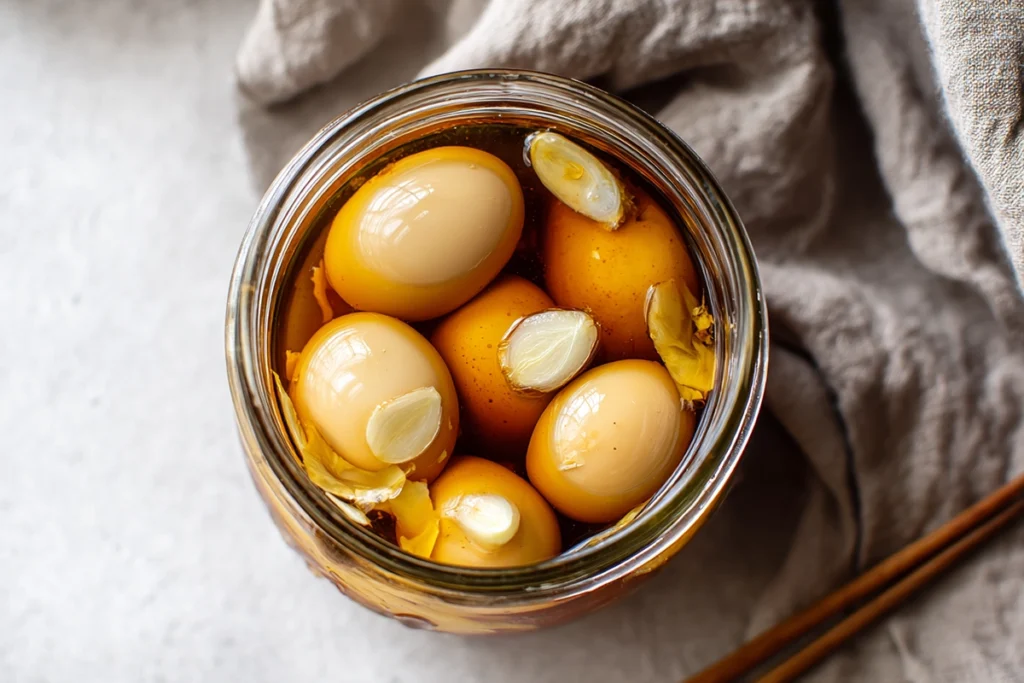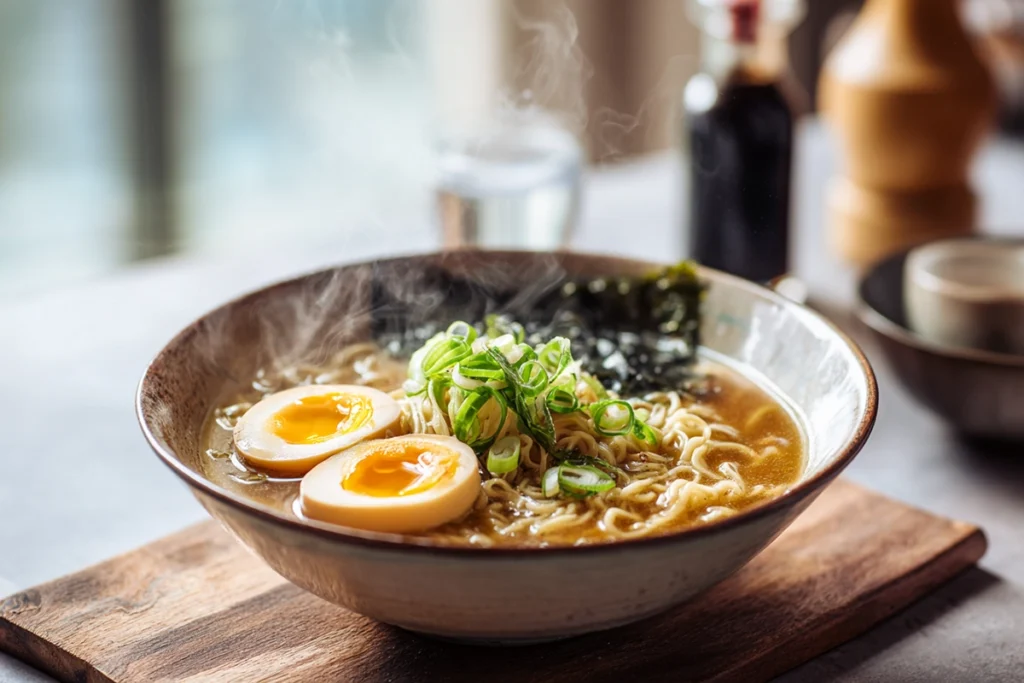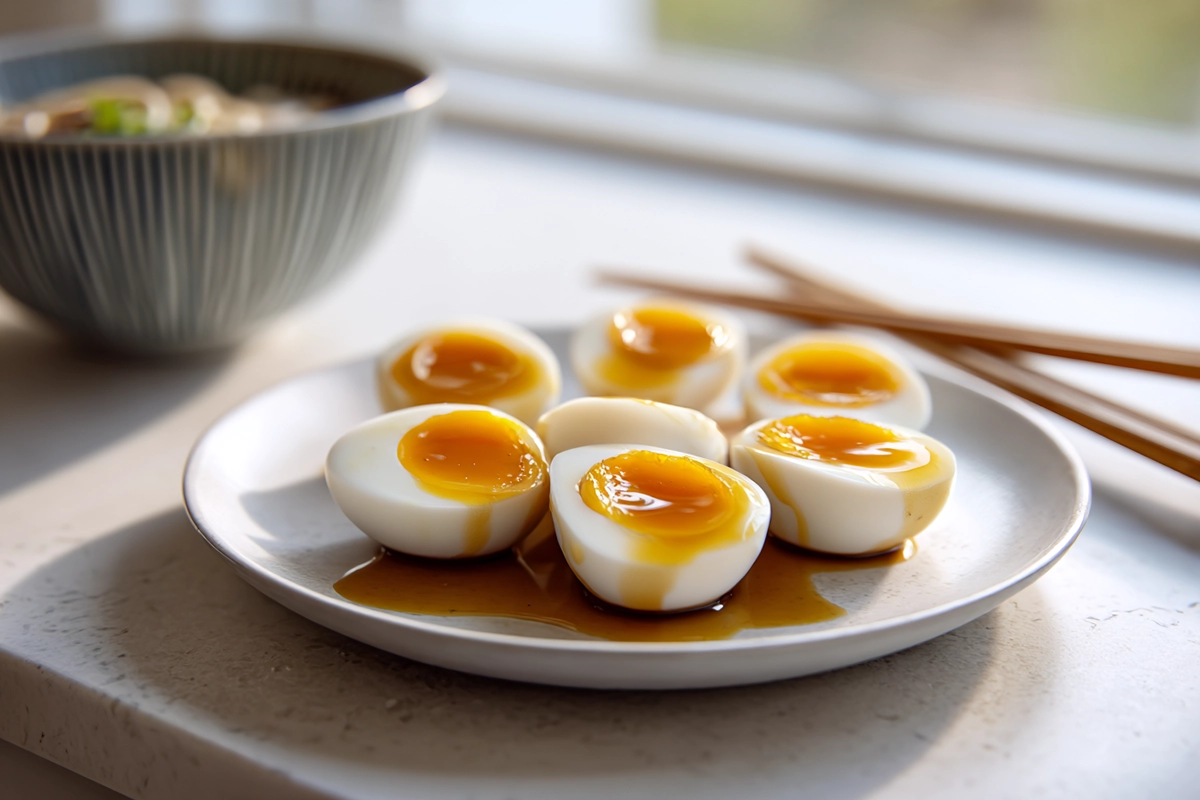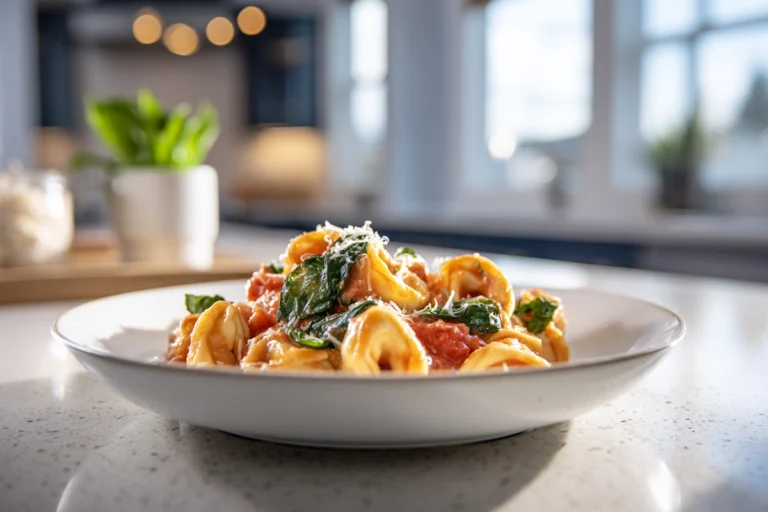Ramen Eggs: How to Make Perfect Ajitsuke Tamago at Home
If you’ve ever slurped a steaming bowl of ramen and paused mid-bite because the jammy, marinated egg stopped you in your tracks, you’re not alone. The first time I tasted ramen eggs, it was at a tiny shop in Seattle’s International District. The rich soy-mirin flavor soaked into the whites, the golden yolk still soft and glistening—one bite and I was hooked. Since then, I’ve been chasing that perfect balance of savory, sweet, and umami. Making them at home may sound intimidating, but once you learn the timing and marinade, you’ll realize it’s not some chef’s secret—it’s a technique you can master in your own kitchen.
Ingredients & Tools You’ll Need
Essential Ingredients
- 6 large eggs (room temperature)
- ½ cup low-sodium soy sauce
- ½ cup mirin
- ¼ cup sake or water (for non-alcoholic option)
- 2 tablespoons sugar
- 1 clove garlic, smashed (optional)
- 1 slice fresh ginger (optional)
Equipment Checklist
- Medium saucepan
- Slotted spoon
- Large bowl with ice and water
- Timer
- Resealable plastic bag or container for marinating
Starting with room-temperature eggs prevents cracking, while an ice bath halts cooking instantly, locking in that “jammy” texture. A resealable bag keeps the eggs fully submerged in the marinade, even if you’re short on liquid.

Step-by-Step Preparation & Cooking Guide
Boiling the Eggs for a Jammy Yolk
Fill your saucepan with enough water to cover the eggs by an inch. Bring it to a gentle boil, then lower the heat slightly so it’s not a rolling boil. Carefully add the eggs using a slotted spoon and start your timer. For that soft-set yolk that’s perfect for ramen eggs, cook for 6½ to 7 minutes. If you prefer a firmer center, go up to 8 minutes.
Cooling and Peeling
Once the timer beeps, immediately transfer the eggs into the ice bath. Let them cool for at least 5 minutes. This stops the cooking and makes peeling much easier. Gently crack the shells and peel under running water for the smoothest result.
Creating the Marinade
In a small saucepan, combine soy sauce, mirin, sake (or water), and sugar. Warm the mixture over low heat just until the sugar dissolves—don’t boil. Add garlic and ginger if you’d like extra depth. Cool the marinade to room temperature before adding the eggs.

Marinating for Maximum Flavor
Place the peeled eggs in a resealable bag or shallow container. Pour the marinade over the eggs, ensuring they’re fully coated. If needed, add a little water or place a folded paper towel on top to keep them submerged. Refrigerate for at least 4 hours, but 8–12 hours delivers a deeper flavor and darker exterior. Turn the eggs occasionally for even coloring.

Serving Ideas & Pairings
Classic Ramen Bowls
Slice the eggs lengthwise for a professional touch and nestle them into miso, shoyu, or tonkotsu ramen. Their umami-packed whites and creamy yolks elevate even instant noodles.
Beyond Ramen
Don’t limit these to soup. Place ramen eggs atop a steaming bowl of rice for a quick lunch. Toss them into a spinach salad for a protein boost or tuck them into a sandwich for a surprising twist. They’re also a favorite in bento boxes, holding their own as a savory snack.
Presentation Tips
Use a sharp, wet knife to slice without tearing. Sprinkle with sesame seeds or chopped green onions, or dust with furikake for a pop of color and crunch.

Dietary Variations & Substitutions
Vegan or Egg-Free Options
While authentic ramen eggs rely on eggs, you can mimic the savory marinade by soaking tofu cubes or even mushrooms in the same soy-mirin mixture. They won’t be identical, but they can provide a similar umami punch for vegan bowls.
Gluten-Free Adaptation
Swap regular soy sauce for tamari or coconut aminos. Always check labels on mirin or substitute with rice vinegar mixed with a touch of sugar if gluten is a concern.
Low-Sodium and Low-Calorie Choices
Use low-sodium soy sauce and dilute the marinade with additional water. Cutting the marinating time slightly also prevents the eggs from becoming too salty while keeping the flavor intact.
Halal or Non-Alcoholic Version
Replace sake and mirin with apple juice or grape juice plus a splash of rice vinegar for tang. This keeps the sweet-savory balance without using alcohol-based ingredients.
Storage, Shelf Life & Safety Tips
Store marinated eggs in their liquid in the refrigerator for up to 3 days. After that, the texture begins to change, and the yolk can dry out. Avoid freezing—soft-boiled eggs turn rubbery and unappetizing once thawed. If you’d like to prepare them ahead of time for a party or meal prep, make the eggs and marinade a day in advance, then marinate overnight. Always discard leftover marinade if it’s been in contact with the eggs for more than a day to prevent bacterial growth.
Bringing ramen eggs into your kitchen means every bowl of noodles, rice, or salad can taste like it came from a cozy ramen shop. The gentle timing, quick chill, and flavorful soak aren’t just cooking steps—they’re little rituals that turn a simple egg into a restaurant-worthy topping. Once you’ve mastered this, you’ll find yourself making extra because these jammy treasures disappear faster than you expect. So grab a pot, set your timer, and make your next ramen night unforgettable.
FAQ
How long should I marinate ramen eggs for the best flavor?
For a clean yet flavorful marinade, 4-12 hours usually hits the sweet spot. If you let them sit overnight (about 8 to 12 hours), the flavor deepens nicely without becoming too salty. Marinating longer than 24-48 hours can work, but you risk the yolk becoming firmer or the exterior getting overly salty.
Can I make ramen eggs ahead of time for meal prep?
Yes, you totally can. Once cooked and marinated, ramen eggs store well in the fridge (in their marinade or covered) for up to about 3-5 days. They make excellent add-ons for quick meals since you can slice them and toss them into ramen, rice bowls, or salads when you need something flavorful in a hurry.
What is the ideal yolk texture for ramen eggs?
Most people aim for a “jammy” yolk — set around the edges but soft and slightly runny toward the middle. Cooking around 6½ to 7 minutes in simmering water, followed immediately by an ice bath, usually delivers this texture. If you like your yolk more set, add another 30–60 seconds.
Are ramen eggs safe if the yolk is soft?
Yes, generally. Using fresh eggs, heating them to a proper boiling or simmer, and then cooling them quickly minimizes risk. If you’re especially concerned (for example, pregnant or immunocompromised), use pasteurized eggs or cook them slightly longer until the yolk is firmer. Proper storage (keeping them refrigerated) is also key.
Can I reuse the marinade after making ramen eggs?
You can reuse marinade in some cases, but you’ll want to be cautious. Since the eggs have been in contact with the marinade, there’s a risk of bacteria. If you reuse it, boil the marinade first to kill any microbes, cool it completely, and use it fresh. Reusing too many times or storing for too long isn’t recommended.
Print
Ramen Eggs
- Total Time: 4 hours 20 minutes
- Yield: 6 servings 1x
Description
Savory ramen eggs (Ajitsuke Tamago) are soft-boiled eggs with jammy yolks marinated in soy sauce, mirin, and sugar. They add umami depth to ramen bowls, rice dishes, or snacks, delivering rich flavor and a restaurant-quality touch at home.
Ingredients
6 large eggs (room temperature)
½ cup low-sodium soy sauce
½ cup mirin
¼ cup sake or water (non-alcoholic option)
2 tablespoons sugar
1 clove garlic, smashed (optional)
1 slice fresh ginger (optional)
Instructions
Fill a medium saucepan with enough water to cover the eggs by 1 inch and bring to a gentle boil.
Reduce the heat slightly, lower the eggs carefully with a slotted spoon, and cook for 6½–7 minutes for jammy yolks (8 minutes for firmer centers).
Transfer immediately to an ice bath for at least 5 minutes to stop cooking.
Peel eggs gently under running water.
In a small saucepan, combine soy sauce, mirin, sake (or water), and sugar. Warm just until sugar dissolves, then cool to room temperature. Add garlic and ginger if desired.
Place peeled eggs in a resealable bag or container. Pour in the marinade, ensuring the eggs are submerged. Refrigerate 4–12 hours, turning occasionally.
Slice and serve over ramen, rice bowls, salads, or enjoy as a snack.
Notes
Marinating longer than 12 hours deepens color and flavor, but can make eggs too salty.
Use pasteurized eggs or extend cooking time slightly if soft yolks are a concern.
Discard used marinade after 24–48 hours for food safety.
Ramen eggs are best consumed within 3–5 days of marinating.
- Prep Time: 10 minutes
- Cook Time: 7 minutes
- Category: Appetizer / Side / Topping
- Method: Boiling and Marinating
- Cuisine: Japanese
Nutrition
- Serving Size: 1 egg
- Calories: Approx. 80 kcal
- Sugar: 2 g
- Sodium: 450 mg
- Fat: 5 g
- Saturated Fat: 1.5 g
- Unsaturated Fat: 3 g
- Trans Fat: 0 g
- Carbohydrates: 2 g
- Fiber: 0 g
- Protein: 6 g
- Cholesterol: 185 mg
What Are Our Readers Saying?
There are no reviews yet. Be the first one to write one.







